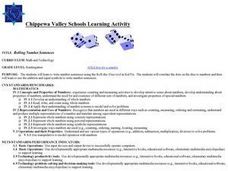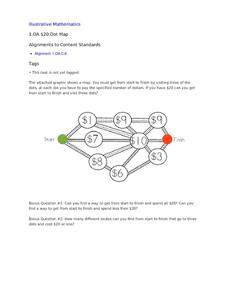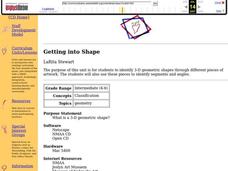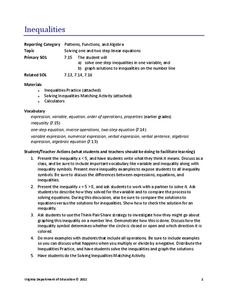Curated OER
Rolling Number Sentences
Budding mathematicians investigate how to write number sentences using the Roll-the-Dice tool in "Kid Pix". They correlate the dots on the dice to numbers and then learn to use the addition and equal symbols to write number sentences....
Illustrative Mathematics
$20 Dot Map
Challenge the addition skills of young learners with this open-ended math problem. The task is simple, get from start to finish by connecting a series of three numbers. The trick is that the sum of the numbers must be less than...
Curated OER
"Just Cruising"
Practice writing the same number sentence in a variety of ways. Learners will explore math cruise ship problems to write equivalent sentences. Then complete word problems which have been included in multiple languages.
Curated OER
Technology: Money Equivalency
First graders,working on computers, drag coins into boxes to equal amounts pictured. Following a demonstration, they demonstrate how to type number sentences. As an extension, 1st graders create equivalent amounts using specific numbers...
Kelly's Kindergarten
June Daily Activities
This is an absolute must-have resource for early elementary teachers! Here you'll find a collection of activities and worksheets for each day of the month of June, with topics ranging from ordering numbers on a calendar or identifying...
Curated OER
Variables and Open Sentences
Fourth graders examine the purpose of variables and identify the missing variable in open sentences. They observe the teacher solve a variety of problems, complete a worksheet as a class, and independently complete another worksheet. ...
Curated OER
Comparing and Ordering Numbers
In this comparing and ordering numbers worksheet, students, working with a partner, problem solve and calculate the answers to five word problems or equations involving numbers.
Curriculum Corner
Guest Teacher Plans: Kindergarten
Emergencies happen. Be prepared the next time you have to call in a substitute with a lesson plan designed to meet the needs of a kindergarten class. Throughout the day, class members work with number and alphabet cards, identify numbers...
Illustrative Mathematics
How Many Cells Are in the Human Body?
Investigating the large numbers of science is the task in a simple but deep activity. Given a one-sentence problem set-up and some basic assumptions, the class sets off on an open-ended investigation that really gives some...
Curated OER
Tens and Ones Guided Lesson
Understanding place value will open up a world of math comprehension for your learners. There are three parts to this activity, all with the objective of revealing the decomposition of numbers into tens and ones. First, scholars examine...
Curated OER
Open Sentences
For this open sentences worksheet, students solve and complete 10 different problems related to identifying various types of open sentences. First, they state whether each equation is true or false for the value of the variable given....
Curated OER
Linear Inequalities
Students solve linear inequalities. In this solving linear inequalities lesson plan, students solve one step inequalities algebraically. Students graph the solutions on a number line. Students compare the graphs of various inequalities...
Curated OER
Open Sentences: Pages 32-36
For this math worksheet, students find solution sets for 5 inequalities. Students also answer true or false for equations, given a value of the variable.
Exeter Township School District
Order of Operations
Young mathematicians analyze computation errors by three hypothetical learners. It begins with a scenario that presents an equation that includes addition, multiplication, division, and subtraction. According to the order of operations,...
EngageNY
Solution Sets to Inequalities with Two Variables
What better way to learn graphing inequalities than through discovering your own method! Class members use a discovery approach to finding solutions to inequalities by following steps that lead them through the process and...
Resources for Educators
Math & Science Connection
Whether you're using a collection of Dr. Seuss books to teach basic math skills like counting, adding, and subtracting, or exploring the different states of matter by melting a crayon with a hairdryer, a series...
Curated OER
Two of Everything
Students listen to story Two of Everything, illustrate coins they would put into the Magic Pot using paper and pencil, and solve Magic Pot riddles by viewing slide show and predicting coin totals. Students then create table listing...
Curated OER
Getting into Shape
Young scholars identify 3-D geometric shapes through different pieces of artwork. They examine and identify segments and angles. Students act out shapes and create a piece of artwork. Additional cross curriculum activities are listed.
Curated OER
Intermediate Sentence Completion Exercise 23
In this online interactive grammar skills learning exercise, students examine 10 sentences that are missing words and select the appropriate words to complete each of the sentences and match them to the sentences. Student answers...
Curated OER
The Ten Little Indians Count
Students engage in a fun, hands-on activity that uses a Thanksgiving theme to incorporate one-to-one counting to 10. They utilize a worksheet imbedded in this plan to help them with their counting skills.
Curated OER
Patterns
Second graders create an ABAB pattern with their name. In this early elementary math lesson, 2nd graders first model their names in an ABAB pattern with unifix cubes. They then recreate the pattern using letter stamps on KidPix.
Curated OER
Trading Pennies and Dimes
Second graders, while in the computer lab, explore the strategy of making and grouping to ten. They assess how to trade pennies for dimes and create original word problems along with corresponding number sentences to illustrate grouping...
EngageNY
Percent
Extend percent understandings to include percents less than one and greater than 100. A great lesson has pupils build upon their knowledge of percents from sixth grade. They convert between fractions, decimals, and percents that are less...
Virginia Department of Education
Inequalities
Not all resources are created equal — and your class benefits! Scholars learn how to solve one-step inequalities using inverse operations. They complete an activity matching inequalities to their solutions.























